Street Life - motorcycle road racing in Belgium
The art of attempting not to ride over the dock into the sea!
John Newman
What have the Belgians ever done for us? Well there's moules/frites, chocolate, superb beers, Ghent, Brugge, premiership footballers, and some of the most outrageous motorcycle street racing on the planet.
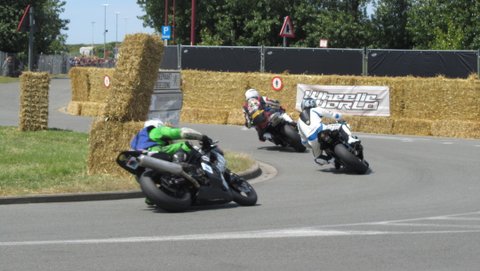
Corner action
Last year I wrote about the public roads racing at Chimay, a Belgian town renowned for its brewing monks. So this year in a
'when shall we three meet again' scenario, my mates Dave, Tref (he's Welsh you know) and I decided to head for Oostend, where another Belgian round of the Europe wide International Road Racing Championships
www.irrc.eu was being held. They are like a more informal version of British Superbikes (BSB): a six round series shared between Belgium (twice), Holland (twice), Germany and the Czech Republic.
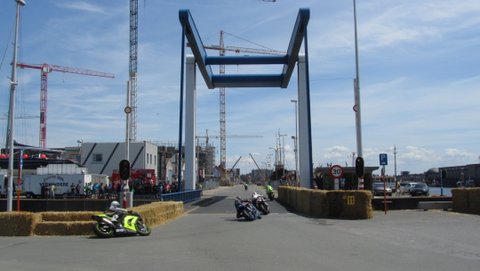
The main straight
Tref (he's Welsh you know) is a self confessed road racing 'anorak', regularly inveigling Dave and I to shovel out a bundle of Euros to attend some hardly known set of races in Ireland or Europe. He directed our attention to Oostend and the You Tube clips which showed full on Superbike championship racing on the streets around their old industrial docks. It looked scary enough on screen; so something that had to be experienced in all its real life sound and fury.
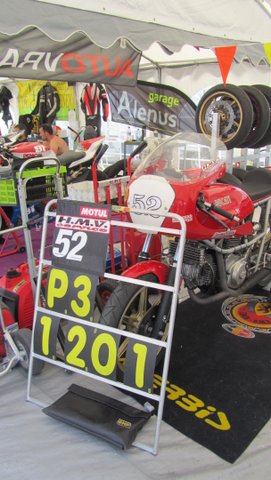
In the paddock
Street life, it's the only life I know
Imagine, and picture if you can, riding a bike at around 160mph down a public dockside road, between cranes with ageing and disused trawlers and a dock one one side, and an assortment of factory type buildings on the other: that's the main straight.
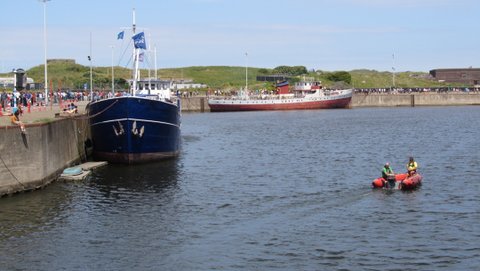
The rescue boat
The track then winds through a series of bends where straw bales offer some protection from the street furniture and buildings, and onto another dockside straight. About which a friendly spectator – an ex racer himself – said there had been incidents of rider and bike going into the water. Was this an Oostend races urban myth? We believed it when we saw the fire service rescue boat patrolling the waters each time a race was on.
A ride to Oostend or any of towns along the northern strip of Europe that looks across the channel doesn't provide great motorcycling. It's flat land and motorway, but the destination was a surprise to the three of us. Rather than a seaside town which had perhaps seen better days, we had arrived in a vibrant and prosperous resort with parks and green space, a bustling marina and harbour area full of restaurants, and a 'walk around' city centre with plenty of pavement cafes and bars – we tested a few in the interests of consumer research.
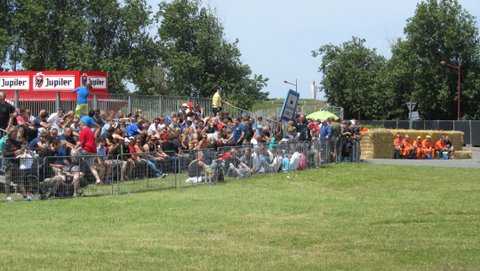
Spectators and marshals
A helpful tourist office provided information about the race area and street maps, and pointed out the (free) harbour ferry service that deposits you within a few minutes walk of the dockside bike action, which we picked up on Saturday when practice and the first of the weekends race programme got under way. It gave us a chance to orientate ourselves at a new circuit, and check out the paddock area: and at 25 Euros for a weekend wrist band this represented good value spectating.
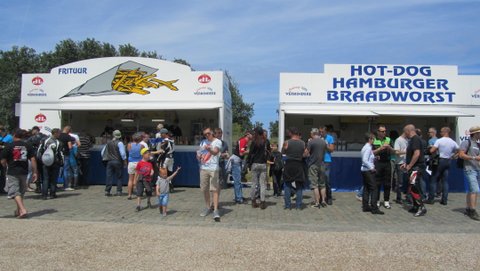
Feeding station!
On race day (Sunday), the crowds poured in enjoying blue skies and warm temperatures. Making the conditions ideal for fast lap times, and the leading riders did not disappoint. Their skill in brushing the straw bales with knees and shoulders going into the turns, and with fairing bodywork often touching on the exit as they pulled upright to gain maximum traction and acceleration, was as courageous as anything that can be seen at the Isle of Man or on the Irish road circuits.
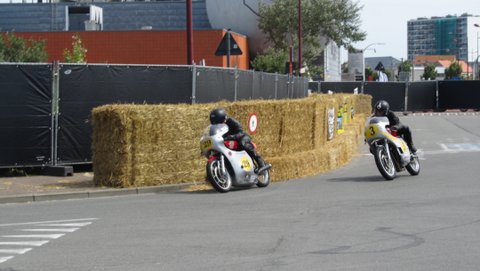
Classics in action
Just like a superstar
A young Belgian rider Timothy Baken ran away with the Supersport (600cc) races and the German Didier Grams was supreme in the Superbike classes. He also ran well in this years NW200 races, gaining places at 17th and 18th. Two to watch if you follow road racing. As ever the classic bikes created and held interest, providing some very different and distinctive sounds from the yowling Japanese fours; including the idiosyncratic wail of a Konig.
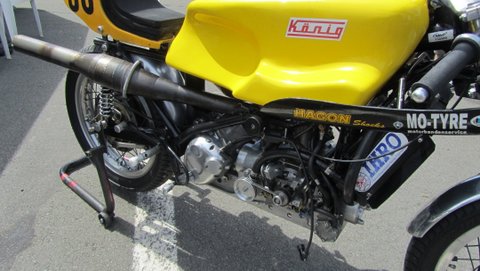
Rare Konig
A what?
The Konig is a flat four two stroke marine engine that was developed in Germany by Dieter Konig and a remarkably talented young New Zealand engineer and racer, Kim Newcombe, who went on to gain GP podiums with the bike he built around this unusual power package. The engine also dominated sidecar GP's in the seventies, but production ceased after Kim was killed in a race at Silverstone. It's fascinating story of a small innovative engineering company challenging and sometimes winning against established factory teams such as MV Augusta, and it was good to hear and witness one on the track, and to see it close up in the paddock. Go to
www.odd-bike.com for the full story.
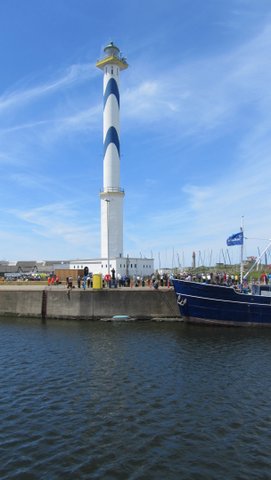
Nice
Sadly the future of the Oostend championship round is in doubt. Within the next couple of years development of this prime waterside site will probably mean the end of racing here, and the future of a club with an eighty five year history of organising street based motor sport events and whose club house and bar provides a friendly gathering place for enthusiasts. Ugly skeletal cranes already dominate the skyline, competing with the elegance of the lighthouse on the nearby dunes. And Dave, Tref and I all agreed that the coming of offices, apartments and the doubtless bland urbanscape this produces will surely diminish the soul of the town. But hey! There's big money to be made.
John Newman
for Wemoto News
Anyone else been to this race or anything like it? We'd like to hear about it if you have
Email us at:
[email protected]








